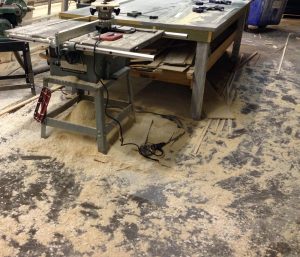
Make sure your floors are clear of wood waste
VICTORIA – The inspection requirements for schools can be fairly extensive. Whether it’s inspecting equipment, playgrounds, fire extinguishers, filter changes, fire alarms, fire codes, etc. There is a lot to look at. And this doesn’t even take into account inspections of building systems, geothermal systems, boilers, HVAC, electrical systems, etc.
Codes and Standards
Several (Code and Standard) examples come to mind, areas that we discuss on a regular ongoing basis. The BC Fire Code requires that all owners of buildings shall be responsible for carrying out the provisions of the Fire Code regardless of local Fire Commissioner, Fire Inspector or other AHJ (authority having jurisdiction) inspections. There are also various CSA standards that discuss the requirements for recreational and play equipment.
Preventive Maintenance – Predicting a Problem before it happens
Whenever there are cutbacks, preventive maintenance usually takes a hit. The need to provide a regular Digitally Documented preventive maintenance program cannot be overstated. How do we know how long your equipment will operate? What condition is the equipment in? What maintenance and testing should be provided if we don’t develop a Digitally Documented inspection program?
What Applies in Buildings – Inspections
- Safety Inspections – Emergency Exiting of Buildings, Fire Protection Equipment, Fire Alarm Systems, Storage Concerns, Fire Planning, Fire Drills, Fire Code Requirements, etc.
- Preventive Maintenance Inspections – Filter Changes, Trash Can Inspections, Mechanical Inspections, Boilers, HVAC, Geo-Thermal, Electrical Systems, Roofs, Building Envelope Inspections, etc.
- Interior Safety – Applies to Hallways, Steps and Stairs, Storage, Hazardous Occupancies (welding, wood workers), etc.
- Exterior Safety – Applies to Playgrounds, Sports Fields, Sidewalks, Steps and Stairs, Parking Lots, Dumpsters, etc.
Your Responsibilities
- You are required to inspect your buildings.
- You are required to maintain a record of inspection for any AHJ’s review.
- You are required to inspect air movement systems, filters, boilers, electrical equipment, HVAC systems, etc.
- You are required to inspect all fire protection equipment (fire extinguishers, fire suppression systems, fire alarms systems, sprinkler systems, standpipes, etc.).
Inspection requirements should encompass
A regular (monthly) inspection program, preferably digital should be developed and put into place which covers the following areas as a minimum:
- All rooms, hallways, means of egress, exterior exit stairs, pathways and fire exits;
- All mechanical systems, heating, electrical, plumbing;
- Fire safety systems, fire alarms, sprinkler systems, fire extinguishers, fire suppression systems, etc.;
- Hazardous Processes and Operations
- All exterior areas including playgrounds, sports fields parking lots, sidewalks, steps, stairs and walkways.
Conclusion
Remember the following:
- It is your building / facility – you are required to keep it operational and safe.
- Identify all areas to be inspected. This makes it easier to determine specific ways of developing an inspection Program that will meet your requirements.
- Develop a Monthly Inspection program. Monitor your progress, make changes if needed.
- Stay informed.
- Talk to Risk Management professionals, people in your industry, staff and various other organizations.


